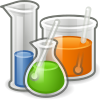
Back Chemiese ewewig Afrikaans توازن كيميائي Arabic Equilibriu químicu AST Kimyəvi tarazlıq Azerbaijani Хімічная раўнавага Byelorussian Химично равновесие Bulgarian রাসায়নিক সাম্যাবস্থা Bengali/Bangla Hemijska ravnoteža BS Equilibri químic Catalan ھاوسەنگیی کیمیایی CKB
| Part of a series on |
| Chemistry |
|---|
 |
In a chemical reaction, chemical equilibrium is the state in which both the reactants and products are present in concentrations which have no further tendency to change with time, so that there is no observable change in the properties of the system.[1] This state results when the forward reaction proceeds at the same rate as the reverse reaction. The reaction rates of the forward and backward reactions are generally not zero, but they are equal. Thus, there are no net changes in the concentrations of the reactants and products. Such a state is known as dynamic equilibrium.[2][3]
- ^ Atkins, Peter; De Paula, Julio (2006). Atkins' Physical Chemistry (8th ed.). W. H. Freeman. pp. 200–202. ISBN 0-7167-8759-8.
- ^ Cite error: The named reference
ajwas invoked but never defined (see the help page). - ^ IUPAC, Compendium of Chemical Terminology, 2nd ed. (the "Gold Book") (1997). Online corrected version: (2006–) "chemical equilibrium". doi:10.1351/goldbook.C01023